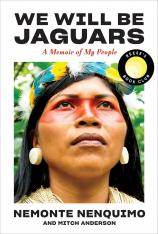Reading Group Guide
Discussion Questions
We Will Be Jaguars: A Memoir of My People

1. At the beginning of the book, Nemonte Nenquimo says that she is scared to write her story. Why do you think that is? What do you think makes her feel afraid?
2. The Waorani have an oral culture: they develop, maintain and share knowledge through storytelling and song, both of which are incredibly important to daily and spiritual life. What do you think are some of the implications for Nemonte of deciding to write a book and create a written record of Waorani history?
3. Besides the writing of the book itself, what kinds of interactions do Nemonte and her people have with writing and documents in the stories she tells?
4. In the introduction, Nemonte writes, “For us, stories are living beings. They breathe life into our homes, into our forests. They pulse in our blood, in our dreams.” What does it mean that a story lives? What are the pivotal stories in the book? Why do you think Nemonte chose to share them? What stories are not told or only partially told?
5. Many books written by outsiders treat the Amazon rainforest as a place of danger. How does Nemonte write about the forest? Discuss some of the descriptions of the forest --- the animal and plant life there --- that most struck you? Why?
6. Trust is a major theme in the book, particularly between Waorani and outsiders. Which moments struck you where Nemonte decided to trust an outsider? Where did she withdraw her trust? In both cases, why do you think she made her decision? Where was her trust respected, and where was it broken?
7. We learn that the first missionaries who landed in Nemonte’s village were speared to death. Since then, the Waorani have hosted the sister --- named Rachel Saint --- of one of those killed. What is her role in the village, and why do the Waorani tolerate her presence? What does the reader learn about the cowori (white people) like Rachel Saint through the perspectives of those in the village?
8. How does Nemonte’s story and experience with Western missionaries and their version of Christianity impact your reflections on missionary movements and religious faith, values and community?
9. On p. 110, Nemonte’s father, Tiri, says, “Oil is the blood of our ancestors.” What is the significance of this statement?
10. Nemonte’s story contains many aspects: it is a coming-of-age story, a story of Indigenous resistance, a woman’s story, a love story and a family story. What aspects of Nemonte’s journey spoke to you? Did you identify with her? How or when?
11. Nemonte and her mother, Manuela, have a complex relationship. One of the turning points is on pages 47 and 48 when Manuela finds out that Nemonte has stolen lipstick from the Baihua family. What do you think about the trajectory of their mother-daughter relationship, including this incident?
12. What do you think the authors mean by the title WE WILL BE JAGUARS? What does it mean for the Waorani people to become jaguars? Do you think other people, readers in the United States for example, could become jaguars? How so?
13. If you could have a discussion with Nemonte and the women of her community, what would you want to talk about? What questions might you ask?
14. On page 316, the authors write, “A part of the dream of this book...is that readers will be moved to learn more, to question more, to consider and take actions in their daily lives that we will never know about.” Are there actions you could take that would have an impact on the lives of Nemonte and her people. Even if they will never know about them?
We Will Be Jaguars: A Memoir of My People
- Publication Date: September 17, 2024
- Genres: Memoir, Nonfiction
- Hardcover: 368 pages
- Publisher: Harry N. Abrams
- ISBN-10: 1419763776
- ISBN-13: 9781419763779






